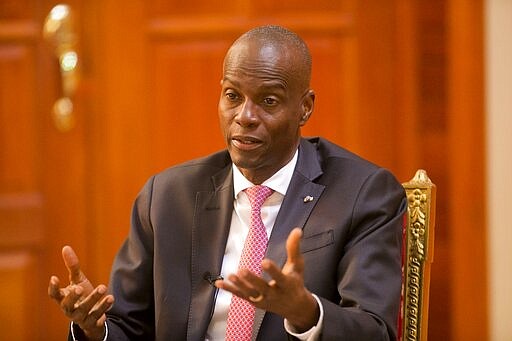Haitians rush for supplies after first COVID-19 cases found
Evens Sanon | Hagadone News Network | UPDATED 5 years, 11 months AGO
PORT-AU-PRINCE, Haiti (AP) — Haitians rushed to buy food, gas, soap and face masks Friday after the announcement of two imported cases of the coronavirus sparked worries that the Western Hemisphere's poorest nation could be overwhelmed by the illness.
President Jovenel Moise said Thursday that two patients had been quarantined after testing positive for the COVID-19 virus. One was a 31-year-old Haitian who had just returned from Paris and the other was a Belgian volunteering in a Port-au-Prince orphanage.
Moise said the country was closing all airports, schools, factories and seaports. The measure is designed to halt new cases of the virus, but health workers said it could prevent the arrival of important medical supplies and volunteer doctors and nurses if the virus starts to spread inside the densely population nation of roughly 11 million people.
According to the United Nations, some 35% of Haitians lack basic drinking water services and two-thirds have limited or no sanitation services, making it extremely difficult for people to regularly wash their hands as recommended to deter the spread of the coronavirus.
The country just completed its first year free of cholera, a water-borne disease that was imported by U.N. peacekeepers and killed nearly 10,000 people over the last decade.
“We don’t have any basic service. Coronavirus will kill like cholera did," said Marjorie Jean-Baptiste, a beauty-salon worker. "The country doesn’t have any resource to fight back epidemic.''
Gas stations had largely run out of fuel by late Friday afternoon. Haitians, some wearing face masks, crowded supermarkets and street markets buying food, water and cooking gas on the first day of an 8 p.m. to 5 a.m. curfew. Face masks of varying types were being sold by street vendors for about $1 a mask.
“The situation is really difficult,” said a shopper, Herold Caidor. "A lot more people could die than in China or Italy because of a lack of sanitary conditions.''
Elizabeth Campa, a spokeswoman for Partners in Health, a Massachusetts-based non-governmental group that runs medical facilities in Haiti in cooperation with the Haitian government, said her organization was adequately equipped for the time being. But she worried about supplies of ventilators and personal protective equipment if the virus should begin spreading in Haiti.
“We are very concerned at shortages of supplies in the future,'' she said. The current number of ventilators in Haiti is sufficient, she said, but her group ”is keenly aware that dependent on the number of cases in the future, this can change rapidly."
___
Associated Press writer Michael Weissenstein in Havana contributed to this report.
ARTICLES BY EVENS SANON
Haiti's interim PM confirms request for US troops to country
PORT-AU-PRINCE, Haiti (AP) — Haiti’s interim government said Friday that it asked the U.S. to deploy troops to protect key infrastructure as it tries to stabilize the country and prepare the way for elections in the aftermath of the assassination of President Jovenel Moïse.
2 Haitian Americans detained in slaying of Haiti president
PORT-AU-PRINCE, Haiti (AP) — Two men believed to be Haitian Americans — one of them purportedly a former bodyguard at the Canadian Embassy in Port au Prince — have been arrested in connection with the assassination of Haiti’s president, Haitian officials said Thursday.
Haiti's interim PM confirms request for US troops to country
PORT-AU-PRINCE, Haiti (AP) — Haiti’s interim government said Friday that it asked the U.S. to deploy troops to protect key infrastructure as it tries to stabilize the country and prepare the way for elections in the aftermath of the assassination of President Jovenel Moïse.



